

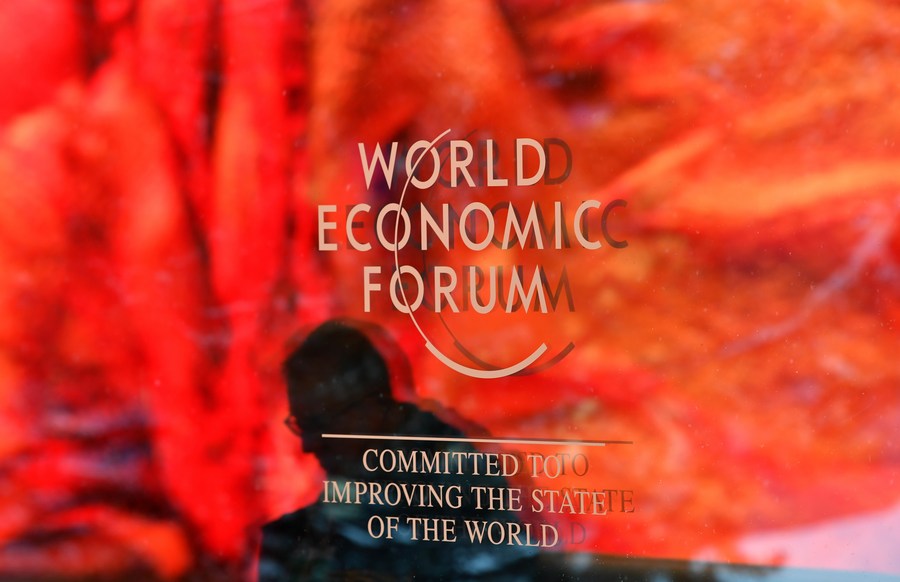
DAVOS, Switzerland - The global economy has regained steam after a difficult COVID-19 pandemic, but experts at the World Economic Forum (WEF) say a recovery is far from certain.
Under the theme "Cooperation in a Fragmented World," the WEF's 2023 annual meeting concluded here on Friday. The gathering came amid unprecedented global challenges such as high inflation, an energy crisis, climate change and geopolitical conflict.
Growth is on an upward trajectory and could witness a more robust recovery in 2023 through global cooperation and following China's adjusted COVID-19 response measures.

CAUTION STILL NEEDED
The global economic outlook is not as bad as feared a couple of months ago, "but less bad doesn't quite yet mean good," Kristalina Georgieva, the managing director of the International Monetary Fund (IMF), told a closing panel at the WEF. "We have to be cautious."
Georgieva said headline inflation was heading down. China's optimized COVID-19 response is expected to boost global growth, with the IMF forecasting the Chinese economy will reach an estimated 4.4 percent, far outpacing global growth.
Signs of declining inflation, resilient consumer spending and strong labor markets, among others, suggest that growth could rebound in the short term.
"Be careful not to get on the other side of the spectrum, from being too pessimistic to being too optimistic. Stay in the middle of realism that seems to serve the world well," Georgieva said.
The WEF issued its Global Risks Report 2023, saying that conflict and geo-economic tensions have triggered a series of deeply interconnected global risks, with the cost of living crisis being the most significant short-term risk. At the same time, climate change and climate adaptation are the most considerable long-term concern.
Georgieva said that future growth prospects depend on how supply chain security is managed.
"If we diversify rationally, the cost of this adjustment would be low -- we put it down to 0.2 percent of GDP. If we trash trade that has been an engine for growth for so many decades, the cost can go up to 7 percent loss of GDP, equaling 7 trillion U.S. dollars," she said.
"Labor markets are holding firm so far, but interest rates are yet to bite, and if they bite more severely, then we can see unemployment going up. And it is very different for a consumer to have a cost of living crisis and a job than the cost of living crisis and no job," Georgieva said.
European Central Bank President Christine Lagarde was also cautious about the global economic outlook.
"The greatest tragedy in this moment would be if central banks were to lurch away from a focus on assuring price stability prematurely, and we were to have to fight this battle twice," said former U.S. Treasury Secretary Lawrence Summers.
Despite recent signs of improvement, "relief must not become complacency," Summers noted.
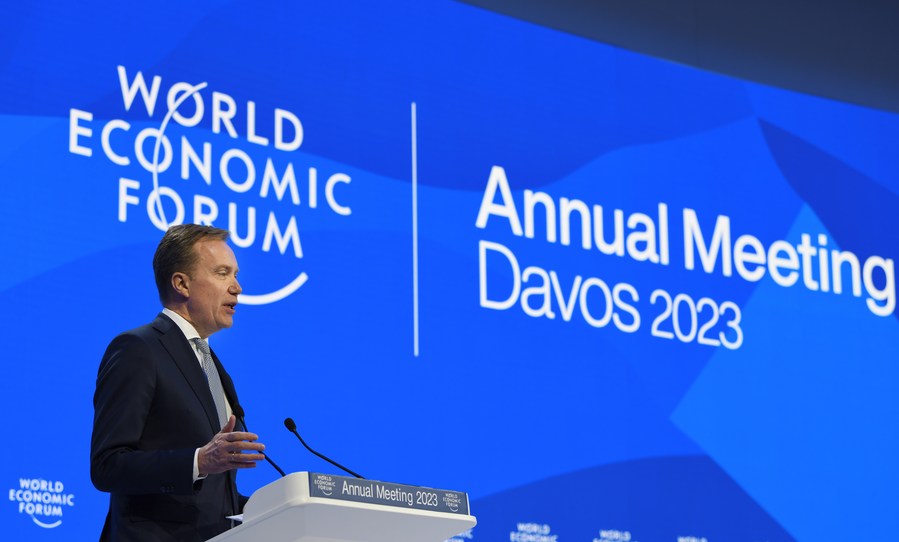
COOPERATION BRINGS OPTIMISM
Attendees at the forum said cooperation would be for global growth. WEF President Borge Brende expressed confidence that "we can shape a more resilient, sustainable and equitable future," but "the only way to do it is together."
United Nations Secretary-General Antonio Guterres called for urgent action on several interconnected challenges, including the global economic crisis and climate. He underlined the need to "forge the pathways to cooperation in our fragmented world."
Leslie Maasdorp, vice president and chief financial officer of the New Development Bank, told Xinhua, "Without multilateral cooperation, you cannot really deal with challenges that are cross-national ... I believe that the one positive lesson we can learn from COVID is that we are interconnected."
Though challenges still threaten the global economy, attendees voiced hope that a severe recession may be avoided.
"We are now heading to a year where hopefully the corporates, the consumers, the state, policymakers will continue to have that resilient, determined approach to engineer the transitions that must take place," Lagarde said.
"The situation around the world must be improving a little bit," said Lagarde. "Players are moving from defense mode, that they had effectively been in 2021 and 2022, towards a more competitive mode."
In his closing remarks on Friday, Brende said despite the many complex issues facing the global community, progress had been made at the annual meeting, especially in tackling the most urgent crises of food, energy and climate.
"For me, the greatest lesson of the week has been that although the world is more fragmented today, it does not need to be tomorrow," Brende said.
EXPECTATIONS FOR CHINA
Business leaders worldwide have been pessimistic about the global economy in recent months, but now, cautious optimism is emerging. They are confident about the robust growth of the Chinese economy and expect China to be a "key driver" of a global recovery.

China's economy posted steady growth in 2022 despite pressures including COVID-19 breakouts and a complex external environment, with its gross domestic product growing 3 percent year on year to a record high of 121.0207 trillion yuan (about 17.95 trillion U.S. dollars) in 2022, data from the National Bureau of Statistics showed.
The 2022 GDP growth was published at the time when the WEF was underway. With the better-than-expected data, optimism over both the Chinese and global economies spread in Davos.
Maasdorp was confident in China's expected growth, a sentiment shared across the banking sector. Although he predicted a "bumpy period" in the first quarter of this year and potentially in the second, there are strong expectations for more robust growth driven by consumption in the year's second half.
Haitham Al Ghais, secretary general of the Organization of Petroleum Exporting Countries, praised China for factoring renewable energy into its growth strategy.
"We are extremely proud of the steps taken by the Chinese government to promote renewable energy as a part of the energy mix as required for China to fuel its continuous development and economic growth," he said.
"We are very confident in the Chinese economy and the strength of the leadership and the government and the people of China," Al Ghais said.

The global economic outlook might not be as bad as previously feared, with China's optimized COVID-19 measures expected to boost growth, said the IMF chief on Friday.
Speaking during a closing panel at the World Economic Forum in Davos, IMF Managing Director Kristalina Georgieva said the world's economic prospect is not as bad as a couple of months ago, but "less bad does not quite yet mean good".
The International Monetary Fund downgraded its economic outlook projection three times last year,"so not downgrading (this year) is already good news", she said, adding that inflation seems to start leading into the downward trajectory, particularly headline inflation.
With China optimizing COVID-19 measures, Georgieva said the IMF forecast the country's growth to be at 4.4 percent compared to the 2.7 percent global average in 2023.
"What has also changed in the positive is that we have seen the strength of the labor market, translating into consumers' spending and keeping the economy up," she said. "But we should be cautious."
Georgieva said while labor markets are holding up, interest rates are yet to bite. "If they bite more severely,then we can see unemployment going up. And it is very different for a consumer to have a cost of living crisis and a job, and then to have a cost of living crisis and no job," she said.
"So we have to be thinking of possibly unemployment going up at a time when fiscal space in governments is very tight, there isn't that much they can do to help people. And yet they would be pressed to do it."
Ongoing risks
She also pointed to ongoing risks,including the Russia-Ukraine conflict dampening confidence, especially in Europe.
According to the World Bank's latest Global Economic Prospects report, global growth is slowing sharply in the face of elevated inflation, higher interest rates, reduced investment and disruptions caused by the Russia-Ukraine conflict.
In its January forecast, the World Bank projected the global economy to grow by 1.7 percent in 2023 and 2.7 percent in 2024. The sharp downturn in growth is expected to be widespread, with forecasts in 2023 revised down for 95 percent of advanced economies and nearly 70 percent of emerging market and developing economies.
"If we look at medium-term growth prospects, how we handle security of the supply chains would mean tremendously on our future prospect of growth," she said.
She added if the diversification is done "rationally", it would only cost 0.2 percent of global GDP. But if"we trash the trade that has been an engine for growth for so many years, the cost can go up to 7 percent of GDP - $7 trillion".
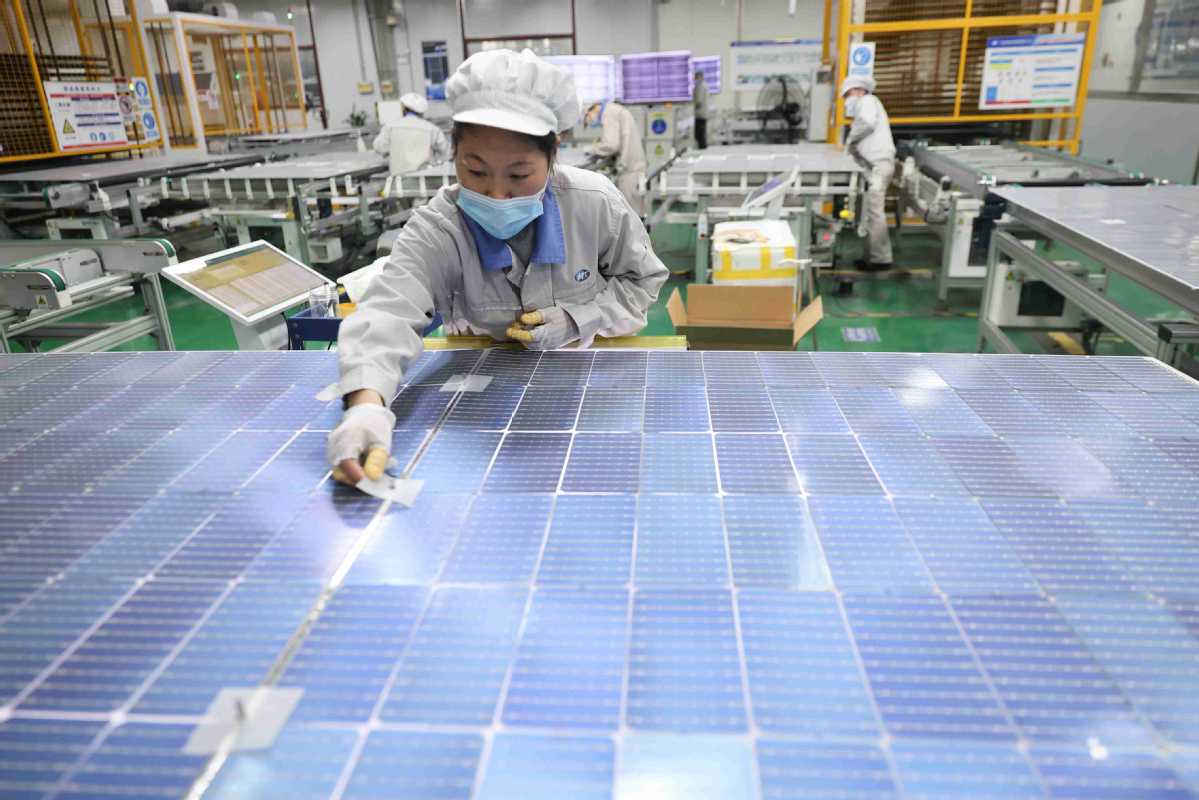
DAVOS, Switzerland -- With increased investment in the green energy sectors, China will contribute very positively to global growth, said participants at the Davos meeting.
During this year's World Economic Forum Annual Meeting, which opened on Monday, climate change was among the top concerns for participants, with China's role in the world's transition to green energy entering the spotlight.
China is one of the largest investors in solar energy, wind energy and battery storage, which are all high-growth sectors, Leslie Maasdorp, vice-president and chief financial officer of the New Development Bank, told Xinhua during an interview at the WEF.
Noting that one in two electric vehicles sold worldwide is in China, Maasdorp said China can play a crucial role in stimulating the low carbon growth strategy of the world economy.
"What impressed me the most is that almost everyone here is talking about transformation towards new energy," said Forest Tu, president for sales and marketing with China's battery producer Contemporary Amperex Technology Co Limited.
The Chinese battery maker has been providing batteries for major car manufacturers worldwide and aims to become a pivotal player in the transition to clean energy.
With well-developed energy-transition solutions, CATL is looking forward to establishing cooperation with governments to help promote electrification, Tu told Xinhua.
In addition to the electric vehicle industry, China's renewable energy development was also highlighted at the WEF.
China is a major producer of renewable energy, WEF President Borge Brende told Xinhua before the annual meeting's opening.
Renewables are not only good for the environment and climate but also create much more jobs than traditional fossil fuel industries, Brende noted.
"We are extremely proud of the steps taken by the Chinese government to promote renewable energy as a part of the energy mix as required for China to fuel its continuous development and economic growth," Haitham Al Ghais, secretary general of the Organization of Petroleum Exporting Countries, told Xinhua.
He hailed China's "ambitious targets" that have been laid out by the leadership to be carbon neutral, saying that China is taking a leading role, and "we really commend China for that direction."
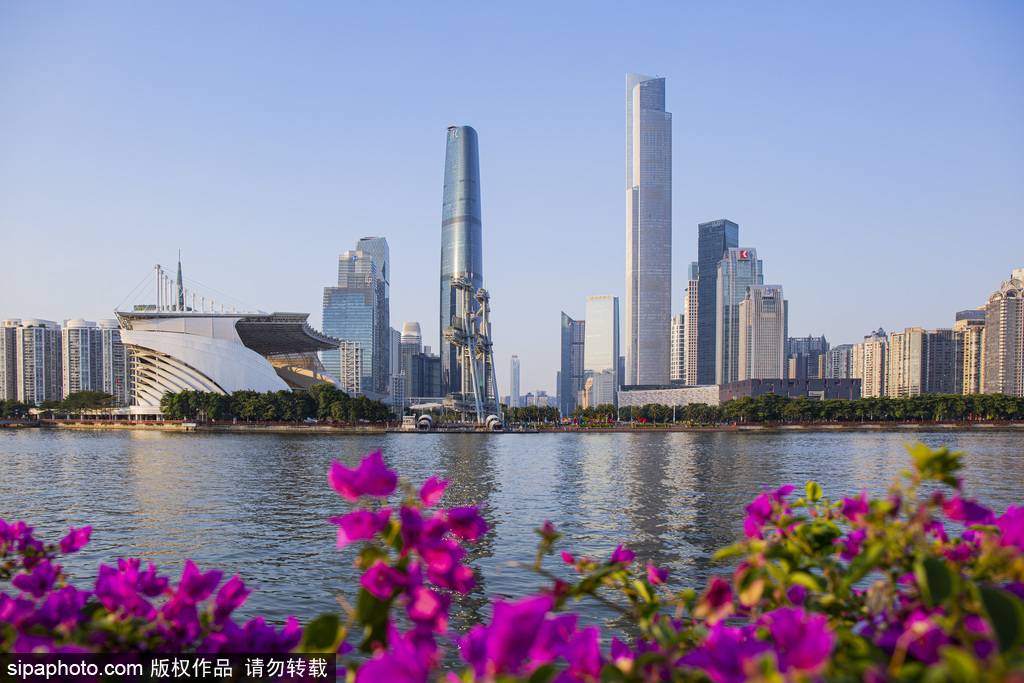
DAVOS, Switzerland - In the face of a volatile global economy, decades-high inflation and geopolitical conflict, the prospects for Chinese economic growth have become a hot topic here at the ongoing annual meeting of the World Economic Forum (WEF).
Under the theme "cooperation in a fragmented world," many attendees said they believe that China's optimization of its COVID-19 response will lead to more robust and prosperous growth and contribute to the recovery of the global economy.
KEY DRIVER
Ahead of the WEF's annual meeting, Saadia Zahidi, WEF managing director, told Xinhua that China's optimization of its COVID-19 response "will be a big boost to global growth and inject optimism back into the medium to the long-term trajectory for the global economy. That's certainly one critical piece."
As the overall epidemiological situation improves and life and work return to normal, China's economic and social vitality will be fully unleashed, injecting more confidence and strength into the global economy.
China's optimized COVID-19 response "means a lot to the global economy and energy. And, of course, to trade between China and the rest of the world. This has a significant impact," Haitham Al Ghais, secretary general of the Organization of Petroleum Exporting Countries, told Xinhua.
Adjusting the measures is "definitely a major event, and it will be a key driver for growth," said Laura May-Lung, chairman of Hong Kong Exchanges and Clearing Ltd.
She added that Chinese consumption and the manufacturing sector are set to pick up, both of which the world needs.
"There is a great deal of hope that China's reopening would lead through 2023 to a better impact on global growth," said International Monetary Fund (IMF) Managing Director Kristalina Georgieva.
OPTIMISTIC PROSPECTS
China's economy posted steady growth in 2022 despite pressures including COVID-19 resurgences and a complex external environment, with its gross domestic product (GDP) growing 3 percent year-on-year to a record high of 121.0207 trillion yuan ($17.95 trillion) in 2022, data from the National Bureau of Statistics showed Tuesday.
China's foreign trade also remains a driving force for economic growth, with total goods trade exceeding the 40-trillion-yuan mark for the first time, said China's General Administration of Customs on Friday.
Due to China's better-than-expected economic performance and strong resilience, multiple international investment banks and financial institutions, including Morgan Stanley, Goldman Sachs, HSBC, Barclays and Natixis, have revised up their forecast for China's economic growth rate in 2023.
Bob Moritz, global chairman of PricewaterhouseCoopers (PwC), told Xinhua that he is bullish on China's economic outlook, given its strong consumer base, technological advancement and top exporter's position.
"China has always been very impressive in dealing with challenges. I'm quite optimistic on the outcome," Saudi Minister of Industry and Mineral Resources Bandar Alkhorayef told Xinhua, adding that China is expected to play an essential role in helping to boost global economic growth.
STRONG GLOBAL CONFIDENCE
Seeing rosy prospects for China's economy, many attendees at the WEF said they are confident in its contribution to the global economic recovery and in providing new market opportunities.
"Having lived in China for almost four years ... I have faith in China. I've always said that when people have doubted the Chinese economy, do not discount China, China will come back," Al Ghais said, adding, "we are very confident in the Chinese economy and the strength of the leadership and the government and the people of China."
Business delegations from China are heading to overseas markets to boost trade and investment, presenting new opportunities for Chinese enterprises and their international partners.
Armed with ample business proposals and investment offers, these delegations are expected to share with the world China's development dividends and a desire to strengthen global cooperation.
Growing consumption and increased investor confidence in China will lead to a consumption rebound and stronger economic growth, Vice President of the New Development Bank Leslie Maasdorp said, adding that with an economy of about 18 trillion dollars, China has an important role to play in the recovery of the global economy.
Maasdorp said China will see robust growth in the tourism and green industries. "With new investment in those sectors, it will also contribute very positively to global growth."

DAVOS, Switzerland - China is expected to play an important role in helping boost global economic growth, said Bandar Alkhorayef, Saudi minister of industry and mineral resources on Wednesday, commenting on China's economic performance in the coming years.
Despite the "not very positive" global economic outlook overall, "China has always been very impressive in dealing with challenges. I'm quite optimistic on the outcome," Alkhorayef told Xinhua on the sidelines of the ongoing World Economic Forum (WEF).
China's Belt and Road Initiative and Saudi Arabia's Vision 2030 create "great opportunities for global and Chinese investors," he said, adding that "we see great value that China can bring to the execution of our strategy."
"We believe that China has done a great job when it comes to automation. That's an area where we are betting on in Saudi Arabia," he noted, "automation is key for us to leapfrog in our targets of our industrial strategy."

Rapid transformation sets benchmark for speed of change
Germany's Chancellor Olaf Scholz has championed the country's fast transition toward renewables amid the Russia-Ukraine conflict and declared that Germany is no longer dependent on Russian energy supplies, during a speech at the World Economic Forum (WEF) in the Swiss resort of Davos on Wednesday.
"Within a few months, Germany has made it completely independent from Russian gas, Russian oil and Russian coal," Scholz said, adding that new partnerships in Asia, Africa and the Americas have lessened the country's dependency on Russia.
"Our energy supply for this winter is secured," he said. "The rise of energy price has stopped, and dropped."
He added that Germany's transformation towards a carbon neutral economy is taking on an "entirely new dynamic" because of the pressure of the Russian-Ukraine conflict.
"It is crystal clear that the future belongs solely to renewables for cost reasons, for environmental reasons, for security reasons, and because in the long run renewables promise the best returns," he explained.
Scholz reiterated Germany's 2045 carbon neutral promise and praised the "German speed", as showcased in the building of country's first liquefied natural gas (LNG) import terminal, completed in less than seven months, which could be used for taking hydrogen in the future.
A second terminal was completed last week with a third ready soon, and "more will follow", he said. "Our European neighbors will be receiving LNGs from these terminals."
"Above all it shows Germany can be flexible, we can be unbureaucratic and we can be fast," he added. "We will make this new German speed the benchmark also for the transformation of the economy as a whole."
By 2030, more than 80 percent of Germany's electricity production will come from renewable sources, reiterated the chancellor, referring to a government target set in 2021.
Scholz also promoted hydrogen as he said the first supply chain for green hydrogen is being built up in Germany, using offshore wind power from the North Sea. As the quantity increases, he predicted an environmentally-friendly hydrogen-powered industrial sector will emerge, one that is independent from the volatile prices of fossil fuel.
"One thing is absolutely certain: energy must remain affordable in Germany, in Europe and worldwide," added Scholz, the only G7 leader to attend this year's staging of the annual WEF.
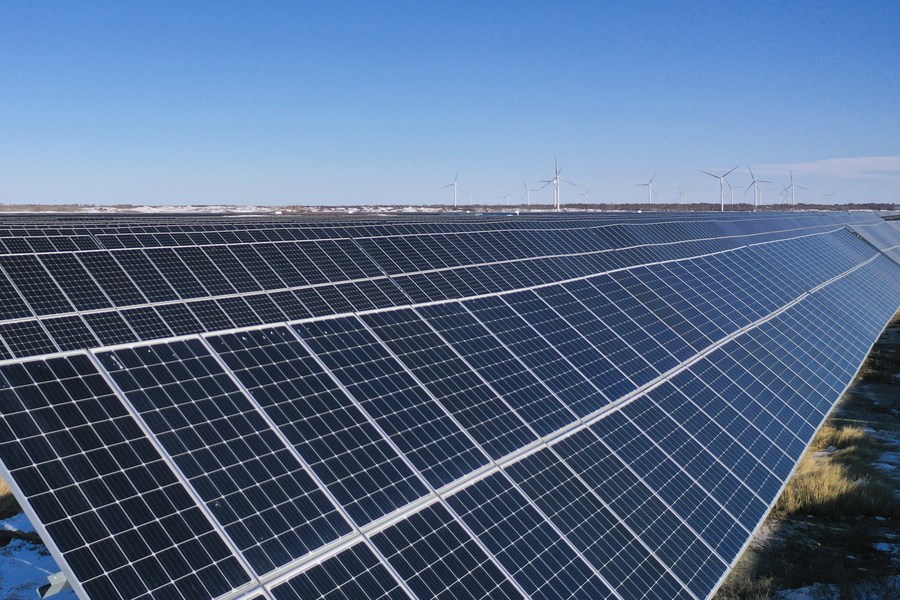
DAVOS, Switzerland -- The head of the International Energy Agency said on Wednesday that he expected China's economy to perform better this year coupled with a rise in demand for oil and gas. He also highlighted the leading role China plays in green technologies.
"China today is the biggest driver of clean energy technologies," IEA chief Fatih Birol told Xinhua at the ongoing World Economic Forum in Davos, adding that China is the world's number one in solar, wind, electric cars and new nuclear facilities.
"This is very good, but at the same time China has to find ways to deal with coal emissions. I very much hope that China will reach a peak of emissions before 2030 and will reach its targets," he said.
China aims to have its CO2 emissions peak before 2030 and achieve carbon neutrality before 2060.
Asked about his outlook for energy prices, he said that 2023 will be a "very difficult year for the energy markets" because there are still uncertainties such as the Russian energy export situation and the global demand.
Birol said that in 2022, demand for oil and gas in China declined for the first time in 40 years.
"If it rebounds, and I believe it will rebound with the economy growing in China, it will have a significant impact on the markets because China is the number one oil and number one LNG (liquefied natural gas) importer in the world," he said.
Soaring global prices across a number of energy sources, including oil, natural gas and coal, have hammered consumers as they already had to deal with rising inflationary pressures around the world.
The International Monetary Fund projected global economic growth to slow down from 3.2 percent to 2.7 percent this year in its report last November, while it expected the Chinese economy to expand by 4.4 percent in 2023.
In December, the IEA said global coal demand would increase marginally this year and urged stronger global efforts to accelerate the transition to clean energy.
Global coal use was set to rise by 1.2 percent in 2022 and surpassed 8 billion tonnes, according to the IEA's annual market report on the sector.
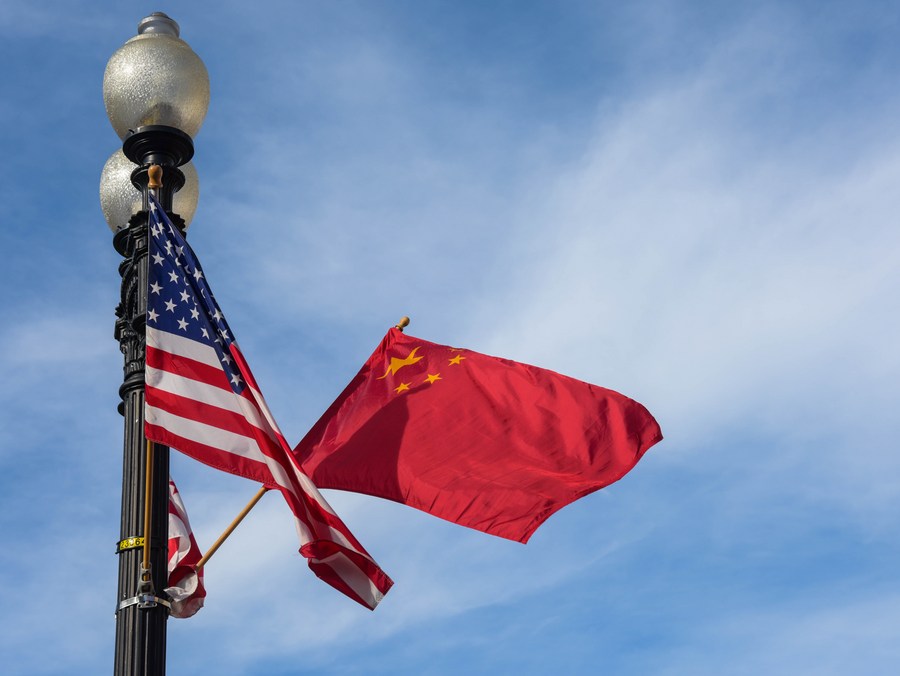
Vice-Premier Liu He met with United States Treasury Secretary Janet Yellen in Zurich, Switzerland, on Wednesday, for talks that were seen as improving bilateral relations while finding ways for China and the US to work together on tackling global challenges.
Both countries agreed to enhance communication on macroeconomic and financial issues, according to a joint statement released after the talks. The statement described the first face-to-face meeting between the two as "substantive, candid and pragmatic".
The two sides also agreed to increase cooperation on green finance on a bilateral and a multilateral basis, such as within the frameworks of the United Nations, the G20 and the Asia-Pacific Economic Cooperation forum, the statement said.
Yellen was invited to visit China this year, and the two sides agreed that their economic and trade teams will maintain communication at all levels.
The meeting was a follow-up to the one between President Xi Jinping and US President Joe Biden in Bali, Indonesia, in November, during which both leaders pledged to increase communication.
Christopher Bovis, a professor of international business law at the University of Hull in the United Kingdom, said, "The significance of the meeting between the Chinese vice-premier and the US treasury secretary is not to be underestimated."
"Face-to-face communication, in diplomatic terms, usually indicates the gravitas of the situation amidst the big picture of international developments and the thematics of the 2023 Davos economic forum," he said.
Bovis said he believes the talks set the agenda that not only will dominate the Davos proceedings, but also project the parameters of current and future cooperation between the US and China, the world's two largest economies.
In a speech on Tuesday at the World Economic Forum's annual meeting in Davos, Liu urged world leaders to abandon the "Cold War mentality" and reaffirmed China's commitment to international cooperation and all-around opening-up, adding that "China's door to the outside will only open wider".
wangmingjie@mail.chinadailyuk.com
United Nations Secretary-General Antonio Guterres addressed the World Economic Forum in Davos, Switzerland, on Wednesday and, during a question session, said: "The question of climate together with the question of biodiversity is an existential threat that today is very close to a tipping point that makes catastrophes totally irreversible."
Video by Han Jing.
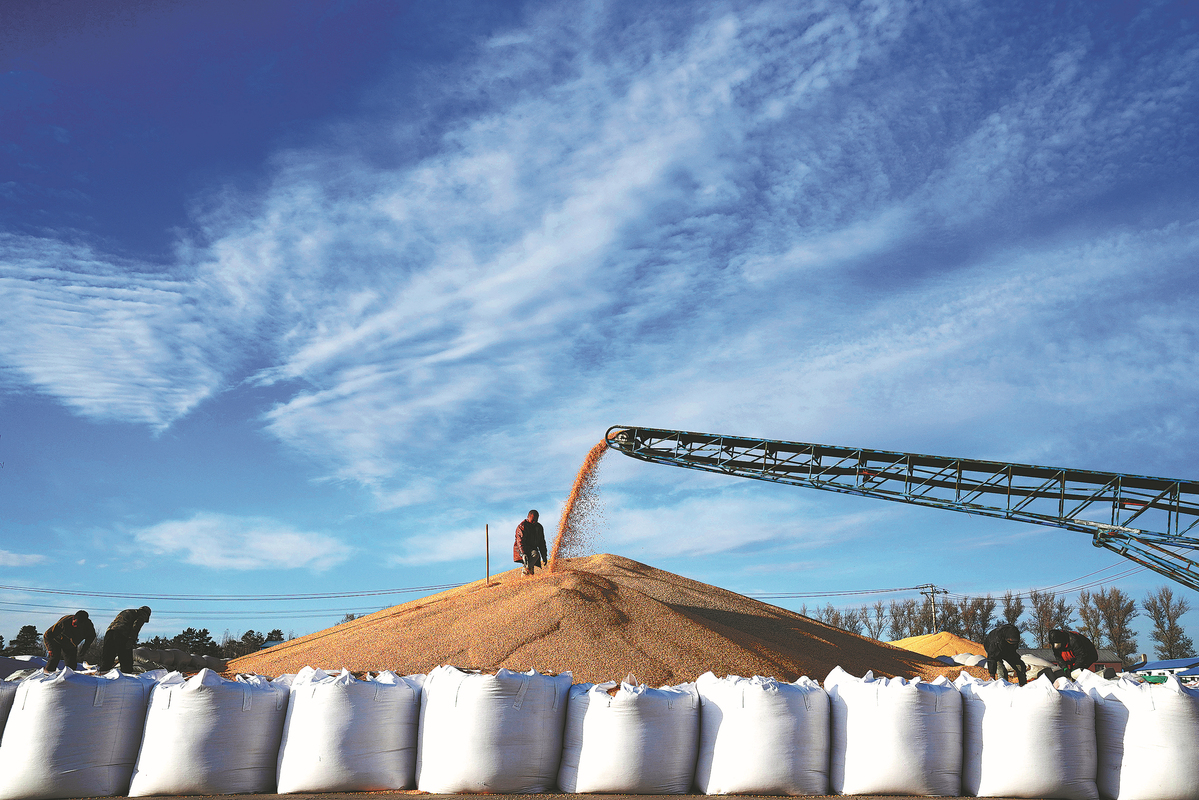
DAVOS, Switzerland - The head of the International Fund for Agricultural Development (IFAD) warned at the World Economic Forum (WEF) here on Wednesday that the ongoing food crisis is likely to continue this year.
"For 2023, we're not expecting a better situation than for 2022. Some of the shortcomings in the global supply chains that we have seen in 2022 will have an impact in 2023," IFAD President Alvaro Lario told Xinhua.
"We are working with many of our partners in seeing how to also unlock the fertilizer situation. However, for 2023 given the planting season in 2022, there will be not much of good news," he said.
GROWING HUNGER
The president said that although action is being taken to address the food crisis, it is barely enough and more investments will be needed.
"We're seeing many of the smallholders suffer because of the cost-of-living crisis, the limited access to food and fertilizers. Unfortunately, the planting season has been lost," he said.
"However, there are several ongoing initiatives on how to address the shortcomings of food systems. Some of them relate to taxation, subsidies, distribution and production. We're looking into ways to increase in a massive way the investments that go into food systems," he said.
According to IFAD, three-quarters of the poorest people in the world live in the rural areas of developing countries. Most of them depend on agriculture for their livelihood.
Climate change, a growing global population, and volatile food and energy prices have the potential to push millions more vulnerable people into extreme poverty and hunger by 2030.
According to the "State of Food Security and Nutrition" report published by five UN agencies, including IFAD, last July, the world is falling further behind in efforts to end hunger and poverty in line with the 2030 Sustainable Development Goals (SDGs).
It showed that the number of people affected by hunger globally rose to 828 million in 2021, an increase of about 150 million since the outbreak of the COVID-19 pandemic.
CHINA'S ROLE
Lario also said that China could serve as an example of how to eradicate absolute poverty. "China is a big partner for us at IFAD," he said.
As both a borrowing and a donor country, China has played "a fundamental role" in the south-south triangular cooperation, said the IFAD chief.
South-South cooperation refers to development cooperation between developing countries in the Global South. When such cooperation involves support from a Northern partner, it is referred to as Triangular cooperation.
"Given what China has experienced over the last decades, they are really a good example of how to lift hundreds of millions of people out of poverty. We still work with China on rural poverty, and they have been a fundamental actor for us," said Lario.
In 2021, China announced a "complete victory" in its fight against poverty, which means absolute poverty has been eradicated in the world's most populous country.
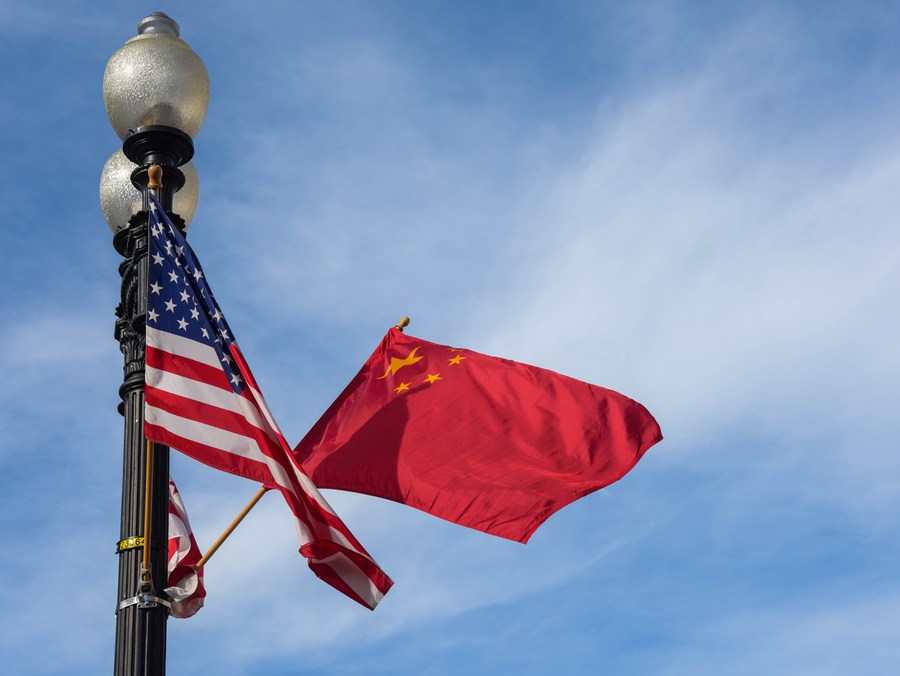
ZURICH, Switzerland - Chinese Vice Premier Liu He, also chief of the Chinese side of the China-US comprehensive economic dialogue, held talks with US Treasury Secretary Janet Yellen here on Wednesday.
Focusing on the implementation of the important consensus reached by the two heads of state during their meeting in Bali, the two senior officials had professional, in-depth, candid and practical exchanges on the macroeconomic and financial situation of the two countries and the whole world as well as on addressing common global challenges. The talks were constructive.
The two sides agreed that the world's economic recovery is at a critical stage and it is in the interest of both countries as well as the whole world for China and the United States to strengthen macro-policy communication and coordination and jointly address challenges in the economic and financial fields.
The two sides discussed issues related to deepening cooperation in macroeconomic and financial fields.
The two sides recognized the importance of sustainable financial cooperation and agreed to strengthen cooperation within bilateral and multilateral frameworks such as the United Nations, the Group of 20 and the Asia-Pacific Economic Cooperation.
Both sides agreed to continue to support emerging markets and developing countries in green and low-carbon development and economic transformation.
The Chinese side also expressed concern over the US economic, trade and technological policies toward China, and hoped that the United States will pay attention to the impact of these policies on both sides.
Yellen is welcome to visit China at an appropriate time this year, Liu said.
Both sides agreed to maintain communication and exchanges between their economic and trade teams at various levels.

DAVOS, Switzerland - United Nations Secretary General Antonio Guterres on Wednesday called for bridging the divides plaguing the world and restoring trust in his address at the World Economic Annual Meeting 2023 here.
The world faces interlinked challenges and "the gravest levels of geopolitical division and mistrust in generations," he said, noting that "we need to bridge all these divides and restore trust."
According to Guterres, "our world is plagued by a perfect storm on a number of fronts." The challenges include the slowdown of global economic growth, the cost-of-living crisis, supply chain disruptions, the energy crunch, geopolitical conflicts, the COVID-19 pandemic and the climate crisis.
The theme of the WEF Annual Meeting -- "Cooperation in a Fragmented World" -- "perfectly sets out the dilemma: we need cooperation, yet we face fragmentation," he said.
He also urged the world to reform and build fairness into the global financial system. "Developing countries need access to finance to reduce poverty and hunger and advance the Sustainable Development Goals," he said.
"Bridging divides and restoring trust means meaningful climate actions ... We must act together to close the emissions gap, to phase out coal and supercharge the renewable revolution," he said.
Developed countries must provide financial and technical assistance to help major emerging economies accelerate their renewable energy transition, he said.
The UN chief called for efforts to advance the Sustainable Development Goals. He also urged the expansion of economic opportunities for women, greater engagement and cooperation for vaccine equity, and the achievement of global food security.
"Now, more than ever, it's time to forge the pathways to cooperation in our fragmented world. The world can't wait," he said.
The WEF Annual Meeting lasts until Jan 20.
The World Economic Forum kicked off on Monday, with PwC Global Chairman Bob Moritz discussing his optimism for China's economy at the "Big Four" accounting firm's Annual Global CEO Survey press briefing.
Video by Brian Chang.
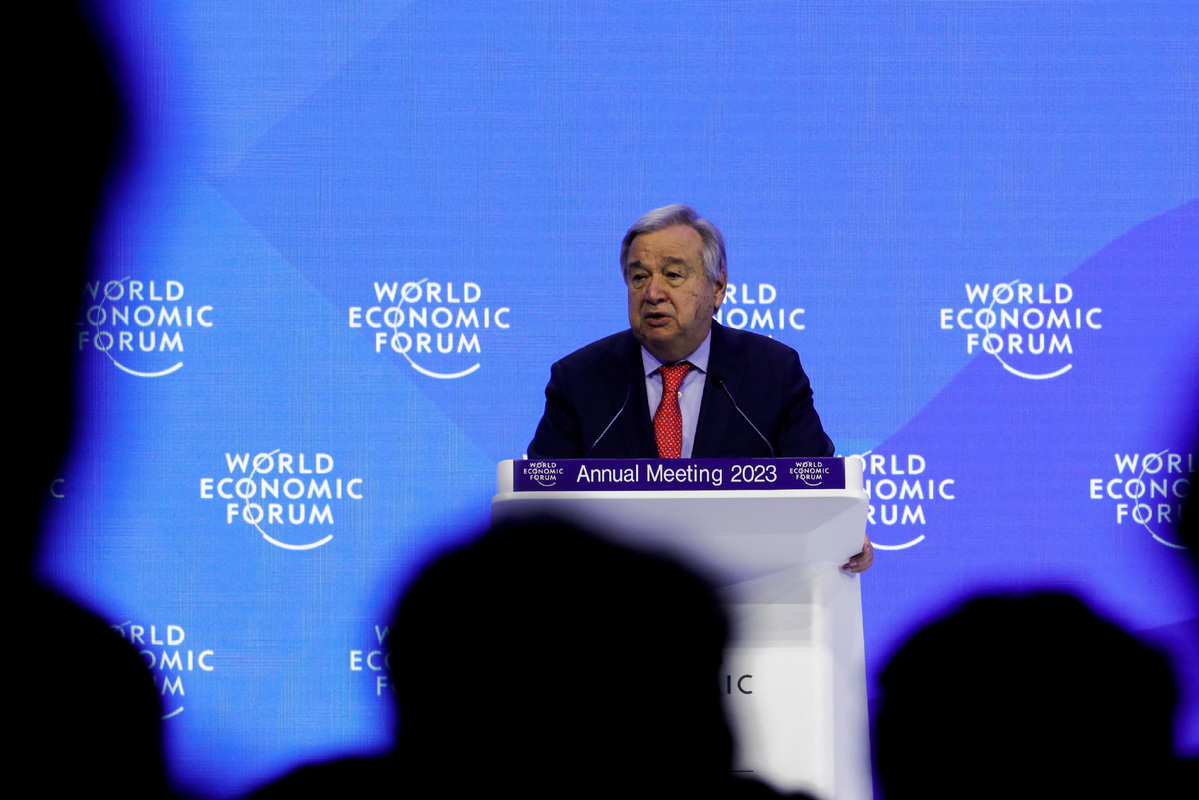
DAVOS, Switzerland - UN Secretary-General Antonio Guterres on Wednesday called on business leaders gathered at the World Economic Forum in Davos to follow the principles outlined by an expert group to make "credible", accountable net-zero pledges.
The United Nations and standard setter the International Organization for Standardization launched the guidelines in November to become a reference text and help organisations come up with solid plans, avoiding slogans, hype and obfuscation.
While companies are increasingly pledging to cut greenhouse gas emissions to as close as possible to zero, the benchmarks and criteria they use "are often dubious or murky", the UN chief told the Davos delegates.
"It leaves the door wide open to greenwashing," he said, referring to unsubstantiated claims by some firms that their products are ecologically friendly.
He urged the participants: "Put forward credible and transparent transition plans on how to achieve net-zero – and submit those plans before the end of this year."
"The transition to net-zero must be grounded in real emissions cuts – and not rely on carbon credits and shadow markets," he said.
The green energy transition of world powers has been one of the central themes at the forum in Davos, where the European Union said it would mobilise state aid to keep firms from relocating to the United States as part of its Green Deal industrial plan.
Guterres said meaningful engagement on climate, trade and technology between the United States and China - at loggerheads over issues ranging from trade to human rights - was essential to prevent confrontation.
"We risk what I have called a Great Fracture – the decoupling of the world's two largest economies," he said.
"This is the last thing we need."
In comments about global preparedness for another pandemic, Guterres said the world had failed to learn the lessons from COVID-19.
"We are nowhere near ready for pandemics to come," he said.
Reuters

DAVOS, Switzerland -- The Chinese economy is heading for strong growth in 2023, Vice President of the New Development Bank Leslie Maasdorp said at the ongoing World Economic Forum in Davos, Switzerland on Tuesday.
Maasdorp said in an interview with Xinhua that China's recent decision to lift COVID-19 restrictions will drive economic growth, which in turn will have a snowball effect on other aspects of the economy such as consumption.
Although he predicted a "bumpy period" in the first quarter of this year, and potentially in the second, there are strong expectations for robust growth driven by consumption in the second half of the year.
China's optimization of COVID policies "will have a very positive impact both for China and for the world economy," Maasdorp said. Many banks have already predicted that Chinese growth for 2023 will be much higher than originally projected.
Growing consumption and increased investor confidence will lead to a consumption rebound and stronger economic growth, Maasdorp said.
With an economy of about $18 trillion, China has an important role to play in the recovery of the global economy, he added.
China's gross domestic product grew 3 percent year-on-year to a record high of 121.0207 trillion yuan ($18 trillion) in 2022, data from the National Bureau of Statistics showed Tuesday.
As the second-largest economy in the world, Chinese growth also drives global growth.
"A recovery in Chinese consumption will have a very positive spin-off for the global economy," Maasdorp said.
Growth areas in China include tourism and green industries, he said. "China is one of the largest investors in green energy, solar energy, wind energy, in battery storage. Those are high-growth sectors. And with new increased investment in those sectors, it will also contribute very positively to global growth."
"Everybody recognizes that China has a very important role to play in the climate agenda," he said.
Many economists have expressed hope that once Chinese companies resume manufacturing at pre-pandemic levels, trade flows will be stimulated and supply chains restored.
China also has a critical role to play in boosting multilateral cooperation, Maasdorp said.
"Without multilateral cooperation, you cannot really deal with challenges that are cross-national ... I believe that the one positive lesson we can learn from COVID is that we are interconnected," he said.
China's successful eradication of absolute poverty is "one of the biggest achievements of humanity," Maasdorp added.
The NDB, headquartered in Shanghai, is a lender established by the BRICS group of emerging nations (Brazil, Russia, India, China and South Africa) in 2015. It aims to become a global development bank, mobilizing resources for infrastructure and sustainable development.

Vice-premier Liu He has said China is "confident" that growth will most likely return to its normal trend, and the country's economy will "see a significant improvement" in 2023.
Speaking at the World Economic Forum's annual meeting in Davos, Switzerland on Tuesday, Liu called for international cooperation, a global response to climate change, and the placing of economic development as the "primary and central task".
"In 2023, we will strive to maintain reasonable economic growth, and keep prices and jobs stable," Liu said. "More focus will be placed on expanding domestic demand, keeping supply chains stable, supporting the private sector, reforming the State-owned enterprises attracting foreign investment, and preventing economic and financial risks."
Over the past 10 years, China's GDP grew from 54 trillion to 121 trillion yuan ($8 billion to $17.86 billion), average life expectancy rose from 74.8 to 78.2 years, and contribution to global growth reached around 36 percent.
The vice-premier, who last attended the forum in 2018, said that China will continue to promote all-round opening-up.
"Opening-up, as a basic state policy, is a catalyst of reform and development, and a key driver of economic progress in China," he said. "China's door to the outside will only open wider."
Liu also addressed the issues of China's real estate sector, which is still a pillar of China's economy, and accounts for nearly 40 percent of bank lending, 50 percent of overall local government fiscal resources, and 60 percent of urban household assets.
From the second half of 2021, China experienced a rapid decline in property prices and home sales. Since then, with the 'blood transfusion' to the property industry, Liu said supply and demand in the market have seen noticeable improvement.
"Looking ahead, China's urbanization is still on a fast track, and the enormous potential demand generated in this process will provide a strong underpinning for the development of the real estate sector," Liu added.
With regard to climate change, Liu said: "China will honor its commitments to the international community, push for global cooperation on climate change, and work with other countries to tackle the serious challenges posed by climate change, and build a community with a shared future for mankind."
Liu also mentioned Beijing's recent policy shift on COVID-19 rules, saying the overall COVID-19 situation in China was steady, and 5 billion trips are expected to be made during the Chinese New Year, commencing on Jan 21.
WEF Managing Director Jeremy Jurgens, who listened to Liu's speech, said: "If you look back to when the vice-premier was last here in 2018, what you see is, despite the crisis, a continuation of the important underlying policies is there.
"Liu also stated that mutual understanding is the prerequisite for cooperation. This is more easily done in person than done digitally. I think that is an important signal that he personally came and met with other world leaders, and that helps build the foundations for enhancing cooperation we need today," he added.
What Jurgens also found important in Liu's speech was the mentioning of stabilization of the real estate sector.
"And after maybe some excessive exuberance earlier on, some real estate organizations were in unhealthy positions, and that's now kind of stabilized and we can hopefully see some resumption of a stronger domestic demand," he added.
John Beirne, vice-chair of research at think tank Asian Development Bank Institute, said: "Chinese Vice-Premier Liu He highlighted that the reopening of the Chinese economy, supported by macroeconomic policy stimulus, is expected to trigger rises in domestic consumption and investment.
"Positive spill-overs to growth trajectories abroad via trade channels can also be expected, given higher demand for imports in China," he continued. "In this way, China can play a key role in supporting the faltering global economy during 2023."
Beirne went on to say: "As well as providing a much-welcomed upbeat assessment of the economic outlook for China, Liu explained how financial stability risks in the property sector are being managed.
"In addition, Liu's comments on the importance of international cooperation and policy coordination are to be commended, notably in respect of China's commitment to global action on tackling climate change."
WANG MINGJIE in Davos, Switzerland
At the invitation of Klaus Schwab, founder of the World Economic Forum, Vice-Premier Liu He attended the meeting at Davos on Jan 17 and made a special address.
"How to strengthen cooperation in a fragmented world is a real problem we all face. We must dig deep into the causes of fragmentation, promote positive-sum games, identify the possible converging areas of cooperation, and explore the mechanisms for doing so," he said.
Video by Han Jing.
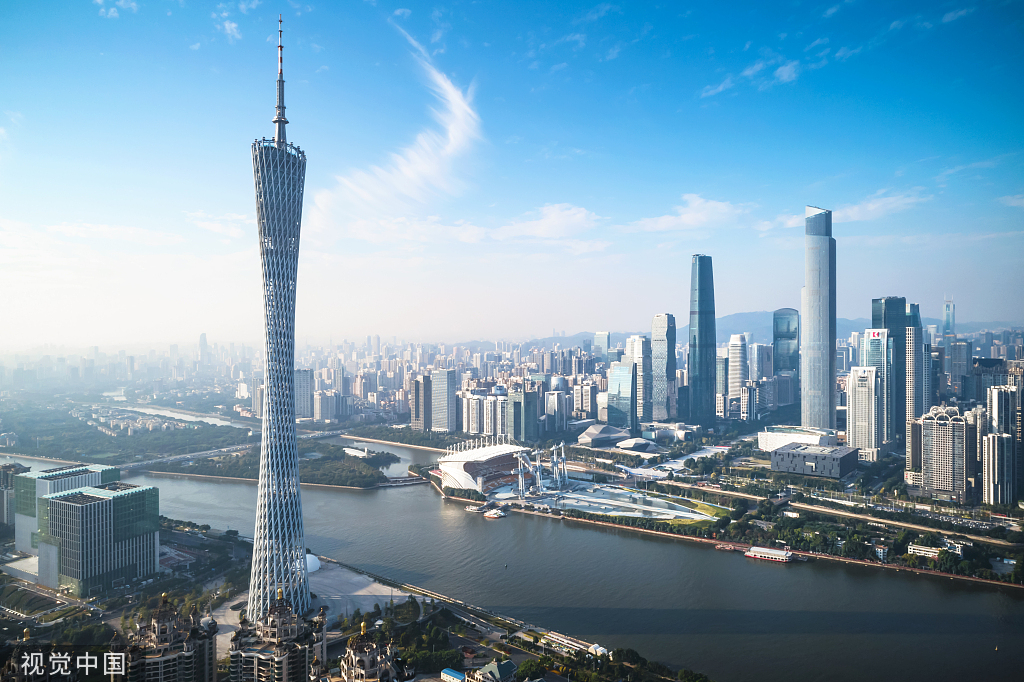
DAVOS, Switzerland - The head of the United Nations Global Compact (UNGC) said at the World Economic Forum (WEF) here on Tuesday that she was optimistic about China's economic performance this year and that the country's contribution to achieving the Sustainable Development Goals (SDGs) by 2030 was crucial.
"China is a dynamic, fast-moving and fast-growing economy. It plays an important role in the global economy. We want to see Chinese businesses contribute even more, not only to China's development but to the SDGs," Sanda Ojiambo, assistant secretary general and chief executive officer (CEO) of the UNGC, told Xinhua in an interview.
Her remarks came as China reported steady economic growth in 2022 despite pressures, including resurgences of COVID-19 and a complicated external environment.
Last year, China's gross domestic product (GDP) hit 121.0207 trillion yuan ($17.95 trillion) as it posted a 3 percent year-on-year expansion, the country's National Bureau of Statistics said on Tuesday.
The UNGC is the world's largest corporate sustainability initiative, which aims to mobilize businesses to align their operations and strategies with its ten principles in areas of human rights, labor, the environment and anti-corruption.
Its goal is to accelerate and scale the global collective impact of business by delivering the SDGs through accountable companies and ecosystems that enable change.
During the COVID-19 pandemic, Ojiambo launched a new UNGC strategy aiming at accelerating and scaling the global collective impact of business.
With only seven years left to achieve the SDGs, adopted by world leaders at the historic Sustainable Development Summit in September 2015, she said she was hopeful that the goals could still be reached.
Encompassing everything from health to gender equality and education, the goals are mobilizing efforts around the world to end all forms of poverty, fight inequalities and tackle climate change by 2030, while ensuring that no one is left behind.
"2023 is the stocktake year, when we are going to take a look at where we are and where we need to go. We're saying we're halfway there, but we're not halfway done," she said, adding that government leadership, inclusivity, private sector's responses and involvement are equally important to driving all of the goals forward.
"The key is to use this opportunity to galvanize energy again, to look at things differently. ... We need more innovation, we need to catalyze a lot of the lessons we learned around how to respond to things like the pandemic and the energy crisis, get more new ideas in," she said.
Commenting on China's contribution, Ojiambo said: "China has made immense gains and contributed to the SDGs by lifting millions out of poverty. That level of ambition is really good, needs to be emulated and can also spread across a lot of other goals."

Davos: Liu's attendance helps build cooperation
Vice-Premier Liu He said on Tuesday that China is confident growth will likely return to its normal trend this year and the country's economy will "see a significant improvement".
Delivering a speech to the World Economic Forum's annual meeting in Davos, Switzerland, Liu called for international cooperation, a global response to climate change and making economic development the "primary and central task".
"In 2023, we will strive to maintain reasonable economic growth, and keep prices and jobs stable," Liu said.
"More focus will be placed on expanding domestic demand, keeping supply chains stable, supporting the private sector, reforming the State-owned enterprises, attracting foreign investment and preventing economic and financial risks."
The vice-premier stressed that China will continue to promote all-around opening-up.
"Opening-up, as a basic State policy, is a catalyst for reform and development, and a key driver of economic progress in China. China's door to the world will only open wider."
Liu also addressed issues relating to China's real estate sector, which he said is still a pillar for the nation's economy and accounts for nearly 40 percent of bank lending, 50 percent of overall local government fiscal resources and 60 percent of urban household assets.
Starting in the second half of 2021, China experienced a rapid decline in property prices and home sales. Since then, Liu said with a "blood transfusion" to the property industry, supply and demand in the market have seen noticeable improvements.
In regard to climate change, Liu reiterated that "China will honor its commitments to the international community, push for global cooperation on climate change, work with other countries to tackle the serious challenges posed by climate change and build a community with a shared future for mankind".
Liu also mentioned Beijing's recent optimization of its COVID-19 policy, saying the overall situation in China was steady. He added that 5 billion trips are expected to be made during the Chinese New Year holiday starting on Saturday.
Jeremy Jurgens, managing director of World Economic Forum, who listened to Liu's speech, said: "If you look back to when the vice-premier was last here in 2018, what you see is, despite the crisis, there is a continuation of the important underlying policies.
"Liu also stated that mutual understanding is the prerequisite for cooperation. This is more easily done in person than done digitally. I think that is an important signal that he personally came and met with other world leaders, and that helps build the foundations for enhancing cooperation we need today," Jurgens added.
John Beirne, vice-chair of research at think tank Asian Development Bank Institute, said, "As well as providing a much-welcomed upbeat assessment of the economic outlook for China, Liu explained how financial stability risks in the property sector are being managed.
"In addition, Liu's comments on the importance of international cooperation and policy coordination are to be commended, notably in respect of China's commitment to global action on tackling climate change."
